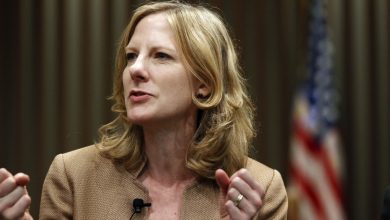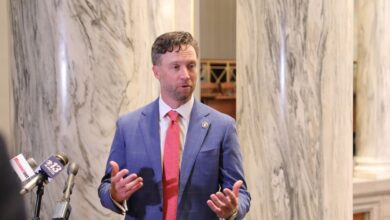She Wouldn’t Teach Without Being Able to Require Masks. So She Was Fired.

Cody Mullins Luedtke couldn’t help but think about the chain reaction.
The laboratory coordinator at Georgia State University’s Perimeter College was slated to teach a botany and an introductory-biology lab course, both in person, this fall. As the semester neared, worry set in, quickly. The more-contagious Delta variant of the coronavirus was ravaging the state, crowding hospitals with new patients. Georgia’s vaccination rate lagged behind the national average. Gov. Brian P. Kemp is against Covid-19-related mandates and has banned state entities, including colleges, from requiring proof of vaccination.
And instructors, Luedtke learned, would not be able to require masks in the classroom. The University System of Georgia, which oversees 26 public colleges, including Georgia State University, which encompasses the two-year Perimeter College, has “encouraged” everyone to wear face coverings inside campus facilities but stopped short of a mandate. Following the system policy, instructors at Perimeter are allowed to ask students to wear masks, so long as “you respect their decision and impose no consequences for not doing so.”
All considered, Luedtke thought it was likely that there’d be transmission of the virus in her classrooms. She thought about her students, many of whom, she said, belong to minority groups — groups that are more likely than white people to be hospitalized and die from Covid-19. Some of her students live with their families. She imagined her students getting sick, or taking the potentially deadly virus home to their loved ones. She imagined the unknown spread.
She decided she couldn’t bear that. She informed the college that, without the ability to require masks, she would not teach in person. Days later, she was fired.
Like Luedtke, others who are teaching in the classroom in Georgia are facing similar moral choices. Two University of North Georgia lecturers have resigned over concerns about in-person teaching, The Times of Gainesville reported. As Covid-19 cases climb, faculty members have implored the university system to require masks, but it hasn’t budged, said Matthew Boedy, an associate professor of rhetoric and composition at North Georgia and president of the Georgia Conference of the American Association of University Professors.
Boedy said he’s heard from faculty parents and professors who have immunocompromised spouses, or relatives with cancer, all of whom don’t want to bring the virus home to their families. They feel they’re faced with a difficult choice of what to prioritize: employment or safety.
For Luedtke, the decision was not an easy one. Last year, when she taught on campus, masks were required, and there were fewer students in classrooms. Though she was “very uncomfortable the whole time,” she said, the mandate made the environment feel safe enough to get through it.
But this time around, classes are full. Masks are only recommended. Just 41.9 percent of Georgia residents between ages 20 and 24 have received at least one dose of the vaccine. On August 16, a week before the first day of the semester, Luedtke sat in her office to prepare. Instead, she began to weep. “I knew I couldn’t do it,” she said. She sent a letter via email to department leaders, saying that she could not “be complicit in the USG’s reckless policy decisions” and that she respectfully refused to teach “in a classroom in which I cannot create a safe environment for my students.”
Luedtke went back and forth over email with her interim chair and a human-resources officer. She was first given the option to resign, which she declined to do. She was still able to perform her duties, she wrote. She could complete her lab-coordination tasks without accommodation, and was willing to teach online or in person if masks could be required.
But Luedtke was required to teach in the assigned mode — in person. Courses “must be held as identified on the schedule,” university Covid-19 guidance for faculty says. She was terminated, effective August 21. She was fired “for refusal to work,” said Andrea Anne Jones, a university spokesperson, in an email.
Jones said that Luedtke was not eligible under university guidelines for remote work and did not seek an accommodation under the university’s Americans With Disabilities Act employee policy. (Luedtke does not have a documented qualifying disability, she said in an email to the human-resources officer.) No other staff or faculty members have been fired for similar reasons, Jones said. She noted that deans and faculty members have said they are seeing “very high levels of mask-wearing in classes and indoor spaces around our campuses, which is very encouraging.”
Luedtke knows her decision has been an inconvenience to her colleagues — her courses have been reassigned to others in the department — which she regrets, but not the decision itself.
“I’m vaccinated. I think I will probably survive Covid if I get it. And I was prepared to wear a mask,” she said. “But it’s really for my students that I’m concerned, especially the unvaccinated ones.”
Ultimately, if she hadn’t made that choice, “I just personally, morally, could not live with myself.”
Source link






